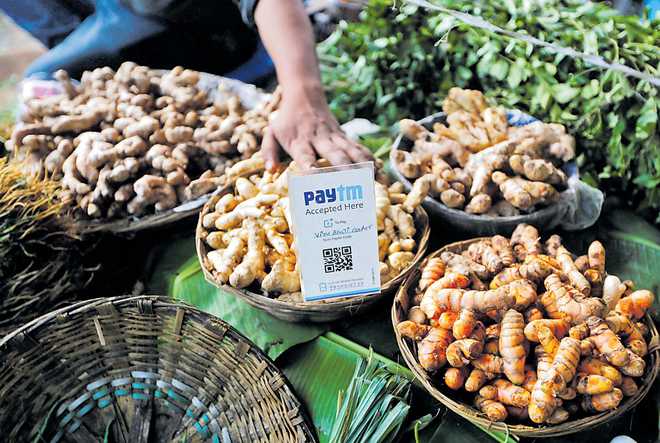
What about the financial literacy required to be comfortable with digital payment systems? An advertisement of Paytm placed amidst vegetables at a roadside vendor''s stall in Mumbai
Mukta Naik, Eesha Kunduri & Manish
“Money is what money does”. In the days following notebandi or demonetisation of high-denomination currency notes of Rs 500 and Rs 1000 on November 8, 2016, which constituted 86 per cent of the currency in circulation, we find that this phrase has leapt out of the pages of a standard monetary economics textbook onto people's lips. It has morphed into “cash is what cash does.” This most tangible form of money, something we can hold, touch and see has been the standard medium of exchange in our day-to-day transactions in India, and possibly elsewhere as well. Cash, to put it simply, is a way of life. The absolute irony, therefore, of scrambling for cash in the midst of this massive and top-down move towards cashlessness has not been lost on anyone. Least of all on informal workers in Delhi — construction workers, loaders and unloaders, vendors, rickshaw pullers, domestic workers as well as contract workers without social benefits like factory workers and security guards.
We spent the first two weeks of December conducting qualitative research with informal workers in various locations across the city. Our conversations have not only shown how deeply dependent on cash people and businesses are, but have also unravelled that the use of cash is multi-layered, complex and at present unavoidable for the majority of Indians, something that policymakers would do well to take into account. A significant number of businesses are entirely cash dependent. For pheriwalas and rehriwalas in Delhi, who sell any number of items like utensils, clothes and food, the lack of cash in the system, especially the lack of change, has spelt major setbacks. In East Delhi's Ghazipur urban village, a pheriwala selling blankets and shawls costing between Rs 100 and 300 in tells us that even if he considers accepting old Rs 500 notes, he has no change to return to his customers. At the outer fringe of the village, a vendor who sells masalas in the local mandi takes the risk of people walking away with credit for the same reason. “What will happen if someone takes away Rs 10 from me, I'm not going to die of hunger!,” he tells us. His defiant tone belies the fact that his earnings, already meagre, have dropped by 50 per cent post-notebandi. Not only informal businesses, but even wage workers across the board report a decline in the availability of work. A home-based worker in the village, who sews designs on the sides of jeans, succinctly described the lack of earnings post-demonetisation as paisabandi.
In Okhla Mandi, south Delhi's wholesale market for fruits and vegetables, we see that post-notebandi a handful out of the approximately 200 wholesalers have begun to display PayTM signs. One of the wholesalers proudly shows us that he has downloaded the app on his phone, but has received no transactions on it yet.In contrast, another is receiving payments through Paytm from retailers who sell to savvy customers, but the trail of digital transactions stops with him. “I need to make payments to the transport company and to those who load and unload the goods in cash,” he says. A third wholesaler pulls out his feature phone and shows it to us, wanting to know if e-wallets will work on that model. He asks: “I can afford a smartphone but do you expect labourers working here to acquire smartphones too?. This simultaneously highlights concerns around the financial literacy required to be comfortable with digital-payment systems.
Leave alone digital payments, we found that many respondents did not interact much with the banking system either. In Kapashera, on Delhi's southern edge, a migrant woman from Bihar tells us that her husband, a security guard in a factory, receives his salary by cheque every month. He withdraws his entire salary in cash to pay rent, school fees and the pending grocer's bill, leaving a small amount with her for incidental expenses through the month. Another couple in the same tenement tells us that they feel no need to have a bank account, since they neither have savings nor do they need to send remittances back home regularly. The bank, therefore, was seen in the light of these specific needs but had no functional role beyond that for those of our informants whose incomes roughly equalled their expenditure.
Far from claiming that informal sector workers, who ostensibly have lower levels of financial literacy, cannot adapt to new ways of doing business, we believe that responding to ever-changing circumstances on the ground is their chief mode of existence and that they will adapt. However, to expect them to do so in the blink of an eye is not only unfair, as we have seen from an almost across-the-board reportage of halved incomes, it is also denying that cash is the most successful, tangible and simple mode of payment they have known. The reality we find on ground is that the cash economy is multi-layered, involving cash payments at multiple points in the chain; ergo, cash isn't something that can be disrupted in one stroke.
Furthermore, the parallel narratives of “black money” and cashlessness that the government has built around notebandi have placed an uncomfortable value judgment on cash transactions even if they are perfectly legitimate ones. This sweeping indictment of cash needs to be replaced with a more nuanced understanding of the cash-driven economy. We need measures to protect those who are genuinely cash-dependent even as we might plan to include them over time through simplified banking, technological and infrastructural interventions and systematic and sustained outreach.
The writers are research scholars at the Centre for Policy Research, New Delhi



























